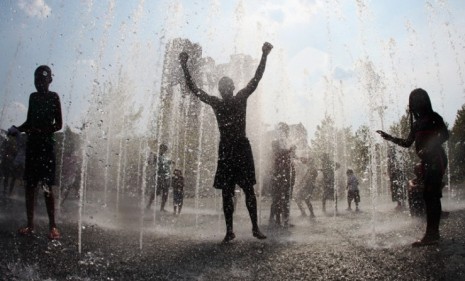Does hot weather really fuel violent crime?
As the mercury climbs, violent crime increases, according to most research. But there may be some important exceptions

A free daily email with the biggest news stories of the day – and the best features from TheWeek.com
You are now subscribed
Your newsletter sign-up was successful
Conventional wisdom holds that violent crime increases during hot weather. Even our language is peppered with references to "hotheads" whose anger "simmers" until they either "lose their cool" and "blow up" or finally "cool down." Researchers, however, have started to question just how meaningful the link is between hot weather and aggressive behavior. Does violent crime really increase in hot weather?
Yes. Research supports the link between violence and heat: Many studies have concluded that violence does rise in hot weather, says Brandon Keim in Wired. Recently, Florida State University researchers found that, over two years, violent assaults consistently increased in Minneapolis, Minn., as temperatures rose toward the 80s. They attributed the change partly to "social opportunity" — when the temperature goes up, more people spend more time outside.
"The Hazy Science of Hot Weather and Violence"
The Week
Escape your echo chamber. Get the facts behind the news, plus analysis from multiple perspectives.

Sign up for The Week's Free Newsletters
From our morning news briefing to a weekly Good News Newsletter, get the best of The Week delivered directly to your inbox.
From our morning news briefing to a weekly Good News Newsletter, get the best of The Week delivered directly to your inbox.
At very high temperatures, crime drops: Even in research that shows violent crimes increasing in warmer weather, there's an upper limit, says James Alan Fox in The Boston Globe. "The rate of violence tends to decline when temperatures reach the 90s." When it gets that hot, people tend to withdraw and seek shelter from extreme heat by staying at home, and out of trouble.
"Heat wave has chilling effect on violent crime"
But global climate change could make things worse: The "heat hypothesis" is backed up by U.S. crime and weather statistics since 1950, says Iowa State University researcher Craig Anderson. And looking forward, we can expect murder and assault rates to rise by 34 crimes per 100,000 people for every eight degrees Fahrenheit the Earth's temperature rises. "When people get hot, they behave more aggressively. There's nothing new there and we're all finding the same thing."
"Iowa State researchers present study on how global climate change affects violence"
A free daily email with the biggest news stories of the day – and the best features from TheWeek.com
-
 6 of the world’s most accessible destinations
6 of the world’s most accessible destinationsThe Week Recommends Experience all of Berlin, Singapore and Sydney
-
 How the FCC’s ‘equal time’ rule works
How the FCC’s ‘equal time’ rule worksIn the Spotlight The law is at the heart of the Colbert-CBS conflict
-
 What is the endgame in the DHS shutdown?
What is the endgame in the DHS shutdown?Today’s Big Question Democrats want to rein in ICE’s immigration crackdown
-
 Epstein files topple law CEO, roil UK government
Epstein files topple law CEO, roil UK governmentSpeed Read Peter Mandelson, Britain’s former ambassador to the US, is caught up in the scandal
-
 Iran and US prepare to meet after skirmishes
Iran and US prepare to meet after skirmishesSpeed Read The incident comes amid heightened tensions in the Middle East
-
 Israel retrieves final hostage’s body from Gaza
Israel retrieves final hostage’s body from GazaSpeed Read The 24-year-old police officer was killed during the initial Hamas attack
-
 China’s Xi targets top general in growing purge
China’s Xi targets top general in growing purgeSpeed Read Zhang Youxia is being investigated over ‘grave violations’ of the law
-
 Panama and Canada are negotiating over a crucial copper mine
Panama and Canada are negotiating over a crucial copper mineIn the Spotlight Panama is set to make a final decision on the mine this summer
-
 Why Greenland’s natural resources are nearly impossible to mine
Why Greenland’s natural resources are nearly impossible to mineThe Explainer The country’s natural landscape makes the task extremely difficult
-
 Iran cuts internet as protests escalate
Iran cuts internet as protests escalateSpeed Reada Government buildings across the country have been set on fire
-
 US nabs ‘shadow’ tanker claimed by Russia
US nabs ‘shadow’ tanker claimed by RussiaSpeed Read The ship was one of two vessels seized by the US military